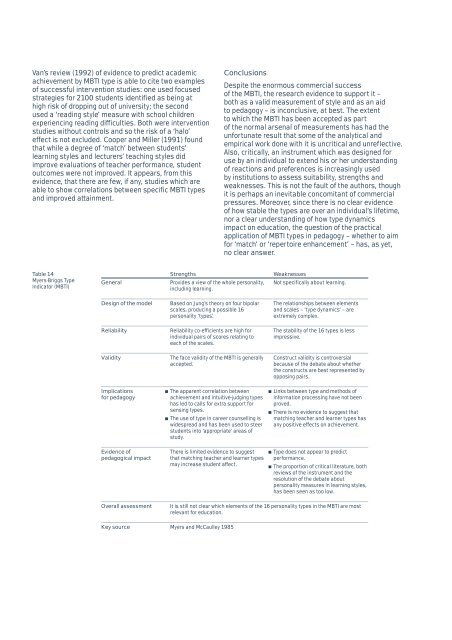learning-styles
learning-styles
learning-styles
You also want an ePaper? Increase the reach of your titles
YUMPU automatically turns print PDFs into web optimized ePapers that Google loves.
Van’s review (1992) of evidence to predict academic<br />
achievement by MBTI type is able to cite two examples<br />
of successful intervention studies: one used focused<br />
strategies for 2100 students identified as being at<br />
high risk of dropping out of university; the second<br />
used a ‘reading style’ measure with school children<br />
experiencing reading difficulties. Both were intervention<br />
studies without controls and so the risk of a ‘halo’<br />
effect is not excluded. Cooper and Miller (1991) found<br />
that while a degree of ‘match’ between students’<br />
<strong>learning</strong> <strong>styles</strong> and lecturers’ teaching <strong>styles</strong> did<br />
improve evaluations of teacher performance, student<br />
outcomes were not improved. It appears, from this<br />
evidence, that there are few, if any, studies which are<br />
able to show correlations between specific MBTI types<br />
and improved attainment.<br />
Conclusions<br />
Despite the enormous commercial success<br />
of the MBTI, the research evidence to support it –<br />
both as a valid measurement of style and as an aid<br />
to pedagogy – is inconclusive, at best. The extent<br />
to which the MBTI has been accepted as part<br />
of the normal arsenal of measurements has had the<br />
unfortunate result that some of the analytical and<br />
empirical work done with it is uncritical and unreflective.<br />
Also, critically, an instrument which was designed for<br />
use by an individual to extend his or her understanding<br />
of reactions and preferences is increasingly used<br />
by institutions to assess suitability, strengths and<br />
weaknesses. This is not the fault of the authors, though<br />
it is perhaps an inevitable concomitant of commercial<br />
pressures. Moreover, since there is no clear evidence<br />
of how stable the types are over an individual’s lifetime,<br />
nor a clear understanding of how type dynamics<br />
impact on education, the question of the practical<br />
application of MBTI types in pedagogy – whether to aim<br />
for ‘match’ or ‘repertoire enhancement’ – has, as yet,<br />
no clear answer.<br />
Table 14<br />
Myers-Briggs Type<br />
Indicator (MBTI)<br />
General<br />
Strengths<br />
Provides a view of the whole personality,<br />
including <strong>learning</strong>.<br />
Weaknesses<br />
Not specifically about <strong>learning</strong>.<br />
Design of the model<br />
Based on Jung’s theory on four bipolar<br />
scales, producing a possible 16<br />
personality ‘types’.<br />
The relationships between elements<br />
and scales – ‘type dynamics’ – are<br />
extremely complex.<br />
Reliability<br />
Reliability co-efficients are high for<br />
individual pairs of scores relating to<br />
each of the scales.<br />
The stability of the 16 types is less<br />
impressive.<br />
Validity<br />
The face validity of the MBTI is generally<br />
accepted.<br />
Construct validity is controversial<br />
because of the debate about whether<br />
the constructs are best represented by<br />
opposing pairs.<br />
Implications<br />
for pedagogy<br />
The apparent correlation between<br />
achievement and intuitive-judging types<br />
has led to calls for extra support for<br />
sensing types.<br />
The use of type in career counselling is<br />
widespread and has been used to steer<br />
students into ‘appropriate’ areas of<br />
study.<br />
Links between type and methods of<br />
information processing have not been<br />
proved.<br />
There is no evidence to suggest that<br />
matching teacher and learner types has<br />
any positive effects on achievement.<br />
Evidence of<br />
pedagogical impact<br />
There is limited evidence to suggest<br />
that matching teacher and learner types<br />
may increase student affect.<br />
Type does not appear to predict<br />
performance.<br />
The proportion of critical literature, both<br />
reviews of the instrument and the<br />
resolution of the debate about<br />
personality measures in <strong>learning</strong> <strong>styles</strong>,<br />
has been seen as too low.<br />
Overall assessment<br />
Key source<br />
It is still not clear which elements of the 16 personality types in the MBTI are most<br />
relevant for education.<br />
Myers and McCaulley 1985


